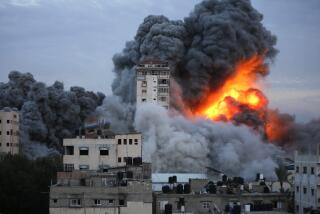A Flawed Intelligence
When he resigned last week, Iraq weapons hunter David M. Kay carefully avoided blaming President Bush for telling the world that Iraq possessed banned weapons and that their use could be imminent. “The intelligence agencies,” he said, “owe the president [an explanation] rather than the president owing the American people.” Not so fast, please. The spy agencies made terrible errors, but the administration was not a passive consumer of intelligence. The CIA’s own Iraq analysts contended last June that the administration pressured them to create worst-case scenarios.
If the rest of the world is to trust what the United States says about emerging threats around the world, the inaccuracies that propelled the U.S. into Iraq need to be traced and corrected. Ideally, CIA Director George Tenet should launch more than the internal investigation his agency is currently conducting. He should create a second team of outside experts, led by someone like former national security advisor Zbigniew Brzezinski or former Secretary of State George Shultz, that studies how to avoid a repeat of the intelligence collapse.
There is plenty of good history from which to begin. As former CIA analyst Ken Pollack notes in the current Atlantic magazine, the intelligence agencies’ belief that Saddam Hussein was pursuing weapons of mass destruction dates to the late 1990s. The failure to predict the biological and chemical weapons that were discovered after the 1991 Persian Gulf War may have led them to overcompensate, resulting in the October 2002 National Intelligence Estimate that Iraq, “if left unchecked ... probably will have a nuclear weapon during this decade.” Kay also points to the agencies’ failure to develop sources inside the Iraqi government. The agencies saw what they wanted to see, not for the first time. The 1961 Bay of Pigs invasion, for example, was expected to result in an uprising inside Cuba; instead, U.S.-backed forces were slaughtered almost before they could set foot on the island.
Any investigation, however, will also have to take into account the administration’s agenda. Vice President Dick Cheney made multiple prewar visits to the CIA and, analysts said, pressured them to link Hussein to Al Qaeda and weapons of mass destruction. Cheney continues to make bogus claims: On National Public Radio last Tuesday, he declared that military trailers discovered in Iraq proved that Hussein was working on bioweapons. Kay’s comments over the weekend indicate this is incorrect.
The burden is on Tenet, who probably has little appetite for a thorough investigation. But failure to detect the 9/11 plot and the perception that the administration skewed intelligence on Iraq have battered confidence in the U.S.’ ability to correctly assess threats -- in North Korea and Iran, in Pakistan and Afghanistan, in Africa and Southeast Asia. That confidence, at home and abroad, needs restoring.
More to Read
Sign up for Essential California
The most important California stories and recommendations in your inbox every morning.
You may occasionally receive promotional content from the Los Angeles Times.










